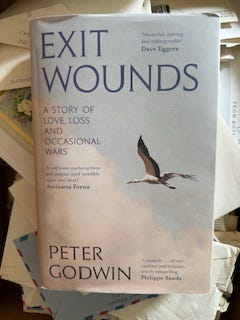Newsletter: reading to the rescue ...
Old, new, unfinished ... it all works
It is harder to write this letter after last November. Since I started this newsletter four years ago, I often struggled with its relevance in our information drenched world but the occasional pats on the back have kept me going. Now, in a world increasingly devoid of coherence or the security that comes with having real adults in charge, this letter feels even more insignificant. One terrible consequence of this troubled democracy of ours is that the news cycle has shifted from an occasional Category 3 or 4 into a constant Category 5. A lot is at stake in every facet of our lives and the more you are aware of it, the harder it is to justify putting your burning world aside to read a book, go to a movie or write a newsletter. I do believe, however, that such pursuits are there precisely for these dark moments. While surely serving as an escape or a relief, they also provide the grace of perspective.
I recently read EXIT WOUNDS by Peter Godwin. A memoir that is so much more than that, Godwin’s book is as good a piece of non-fiction as I have read in the past five years. A symptom of its greatness is how much it resists any kind of summary. His origin story, his war correspondent background frame a life littered with contemporary relevance. His dying mother is straight out of a Maggie Smith cameo. The diction is extraordinary with words that vibrate with meaning. It is a beautifully layered story with historical and philosophical digressions that attracted marginalia like moths to a flame. It was one of those reads that leave you at a loss as to what to read next.
I resist reading too much about Lincoln and our Civil War after years of immersion. It took several enthusiastic reviews of LINCOLN’S PEACE by Michael Vorenberg for me to step back into this well-trodden landscape. Vorenberg is a historian at Brown University and his book is traditional well-researched examination of a myth drenched period of our history. It is dense, very lucid and startling. His thesis that the war never ended when we thought it did and, in many respects, has never ended resonates in today’s troubled world. The many messages are as persuasive as they are subtle. This is not a polemic; rather, it is a scholarly reexamination of the myth of Appomattox and the real war that has continued to this day. This is good solid history without the revisionist trappings that all too often get in the way of the real argument.
I try not to write about a novel I am still reading. If I cannot finish the novel, it has failed (for me) at some level. Maybe because it is just shy of 1000 pages. Maybe because the audiobook is read by the author. Regardless, I am breaking my rule to promote 4321 by the late Paul Auster. There is hardly any dialogue. The sliding door structure is complex with four narratives about one young man. Archie Ferguson’s life begins at birth and, after 500 pages, is now in college … most of the lives that is. The family sagas are close to impossible to track. Great characters exist in one narrative and don’t in another. Auster was a post-modern trickster – often to a fault. Some of that cuteness exists in his opus but it doesn’t matter. The whole thing so far is one of the great explorations of youth, America, family, masculinity and fate that I have ever read. The cherry on top however is that Auster reads his masterpiece. His baritone voice brings each sentence, each thought to life. I found myself doing circles in Central Park without knowing it as Archie’s lives made me laugh and sigh as few novels ever have. I know I have another 500 pages to go. I will send out an SOS if it falls apart. I suspect it won’t.
As I have mentioned earlier, I am beginning to reread books more frequently as my aging mind airbrushes the first reading into relative obscurity. Rereading Edith Wharton’s HOUSE OF MIRTH was a true delight. Wharton has been at the top of my list lately as I read her New York novella trilogy over the holidays. If there is a better writer, pure and simple, I have not met her or him. Checking the novellas out from the stacks of the New York Society Library (the city’s oldest), in their original hardback version made for not only good reading but an experience that felt right out of her days in the city. HOUSE OF MIRTH is Wharton’s other great novel. It stands next to AGE OF INNOCENCE as her one of her masterpieces though I really think the latter is at another level altogether. Regardless, the fact that those twin towers of literature are there is a wonder itself. Which led me to think of other such pairings in the canon … ah, the stuff of the next newsletter. I already feel much better. Thank you …


